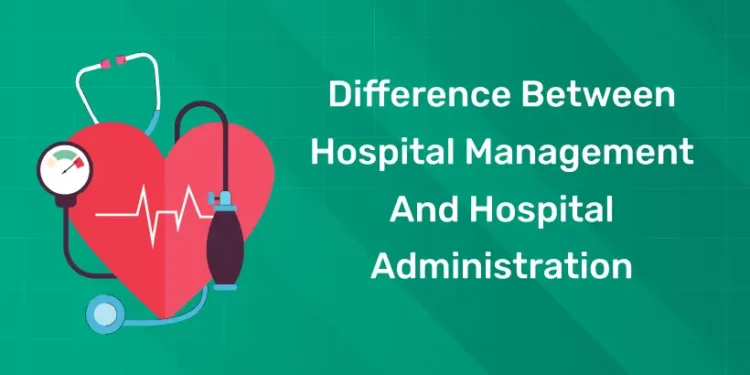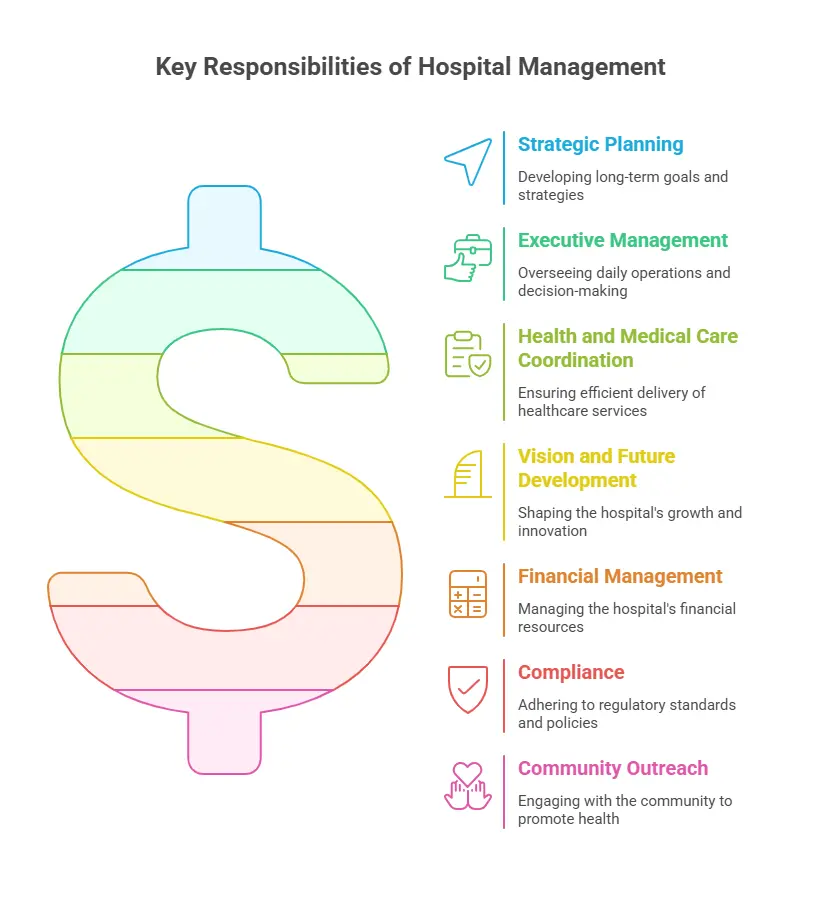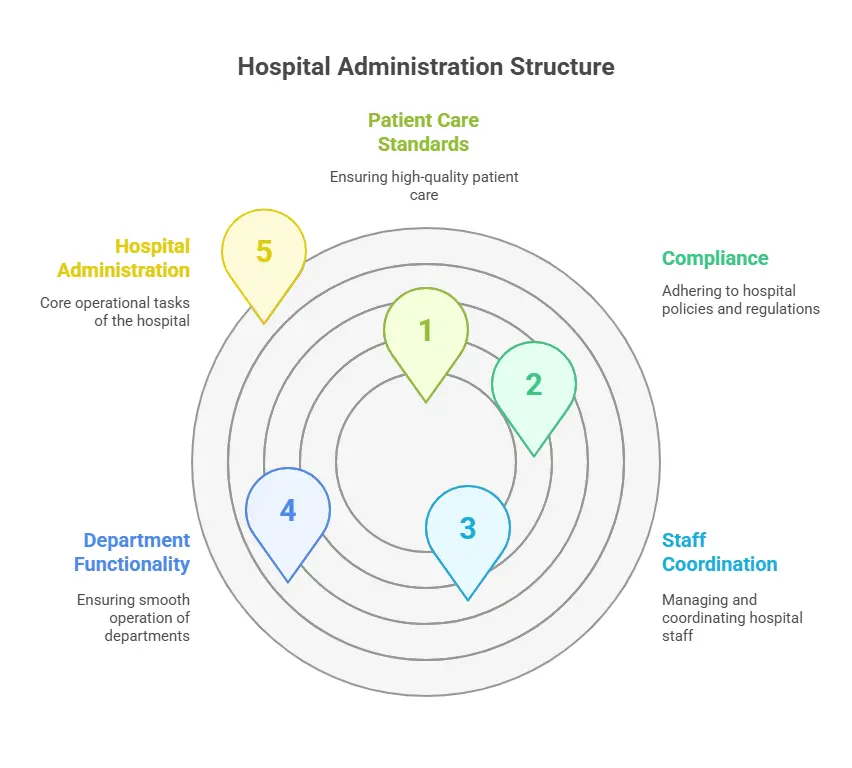Table of Contents
Health care is an advanced system wherein clinical and non-clinical care must function together in harmonic synchrony in order to deliver maximum patient care and effective facility management. Hospital management and hospital administration are two vital components that enable the operation and growth of hospitals and health care organizations within this setup; while the terms are interchangeably applied, they encompass different duties, activities, and areas of interest. Awareness of the difference between them can help students, professionals, and candidates in making a sound career decision in their health care professional career. In this article, we give an overview of the definition, differences, jobs, compensation, and FAQs of both professions.
Get into Our Hospital Administration Course- signup for a free demo!
What is Hospital Management?
Hospital management is the strategic and executive management of a hospital. These professionals are vested with the responsibility of planning, directing, and coordinating health and medical care in the health center. They are responsible for formulating the vision and future development of the health center, finance health, compliance, and community outreach.
Important areas of hospital management are
- Strategic Planning:
Creation of long-term objectives, defining hospital missions, and fostering ongoing improvement.
- Financial Management:
Cost-effectiveness control and revenue stream maximization, budget management.
- Human Resource Management:
Recruiting leadership staff and monitoring policy implementation.
- Policy Development:
Hospital regulation formulation, security policy creation, and quality standards.
- External Relations:
Government officials, stakeholders, investors, and allies coordinate.
- Marketing and Branding:
Hospital marketing of services and reputation upholding.
Hospital management professionals are more likely to occupy top-level positions like CEO, Director of Operations, or Strategic Consultants, where they would make strategic decisions for the organization.
What is Hospital Administration?
1: What is the primary role of a hospital administrator?
Hospital administration is more operational in character and concerns the internal ongoing activities of the hospital. Administrators are tasked with making departments function, coordinating the staff, managing the patients well, and ensuring compliance. They are the interface between medical professionals and hospital policies, and they make sure that standards of patient care are being maintained.
The most important aspects of hospital administration are
Staff Coordination:
Scheduling, performance, and team assignment to nurses, technicians, and support staff.
Patient Services:
Admissions, billing, records, and discharge operations management.
Regulatory Compliance:
Compliance with local and international health standards for the hospital.
Inventory and Supplies Management:
Medical and office supplies storage.
Communication Between Departments:
Seamless coordination of diagnostic, treatment, and support services.
Crisis Management:
Issue resolution at ground level and ensuring prompt resolution of conflicts.
Hospital administrators are usually seen as floor managers, operations executives, or HR administrators, who work behind the scenes to keep things running smoothly.
Hospital Administration Course with Assured Career Growth
Hospital Administration Course by Entri App: Master essential healthcare management skills, gain certification, and secure top roles in leading hospitals
Join Now!Key Difference between Hospital Management and Hospital Administration
Both are very important to the running of a health care institution, yet they have quite distinct functions when it comes to their scope, responsibilities, and impact. Hospital management is more strategic and looks at the “big picture,” whereas hospital administration is more functional and takes care of the “day-to-day” details. These differences affect how they make decisions, how they interact with stakeholders, and how they are in charge of their work.
Differences are significant in:
Focus Area:
Hospital Management: Focuses on long-term objectives, the growth of the institution, and strategy.
Hospital Administration: Running the hospital on a daily basis and providing services.
Responsibility:
Management includes working with people outside the company, building the brand, growing the firm, and making financial decisions.
Management: This includes managing departments within the organization, making sure everything runs well, and dealing with staff and patient difficulties.
Level of Making Choices:
Management: Making judgments on high-level policies and visions.
Administration: Carries out these policies every day and makes sure they are followed.
Interactions:
Management: Works with boards, investors, and other outside groups.
Administration: Mostly works with personnel and departments inside the organization.
Common Job Titles:
Management of the hospital: CEO, COO, and healthcare director.
Hospital Management: Hospital Administrator, Department Coordinator, and Facility Manager.
Get into Our Hospital Administration Course- signup for a free demo!
Career Path & Job Roles
Both hospital management and hospital management careers in the healthcare sector possess stimulating and rewarding job functions, but both possess respective and distinct responsibilities and skills required. Experts who want to work in hospital management typically exercise executive positions and are responsible for overseeing the overall operations of the hospital. Hospital managers, on the other hand, generally oversee groups and departments in order to ensure proper functionality of healthcare services.
Hospital Management Careers are
- CEO: This means Chief Executive Officer; he operates the whole hospital.
- COO: This oversees the offices in the hospital.
- Healthcare Consultant: This is the one who helps the hospitals in actual terms on how to become better.
- Business Development Manager: He has the task of getting the hospital to touch more people and to form more connections.
- Hospital Planner: Assist in planning facilities and project management as a hospital planner.
Hospital administration careers are
- Hospital administrator: He ensures the hospital operates on a daily basis.
- HR manager: deals with recruiting, employee well-being, and ensuring workers behave according to the law.
- Patient services: The individual who manages patient services is in charge of intake, payments, and customer calls.
- Data Manager: This individual maintains patient records and other documents up to date.
- Operations Executive: This individual facilitates overall operations, planning, and timings.
Educational Qualifications:
- For management positions, you require an MBA in hospital or health management, an MHA (Master of Health Administration), or a PGDM.
- For administrative positions, you can do a BBA or B.Sc. in hospital administration, a healthcare administration diploma, or even a nursing or medical degree with additional administration training.
Salary Comparison
You may work in administration with a BBA or B.Sc. in hospital administration, a diploma in healthcare administration, or even a nursing or medical degree followed by training in administration.
In these fields, salary varies based on a variety of factors, such as the kind of healthcare institution (private or public), the job function, the location, and the person’s level of experience. Administrative occupations offer steady and fair amounts, but hospital management professions pay more since they are higher up and more strategic.
Common Salary Ranges: India’s Role (Yearly) USA’s Role (Yearly)
Salary Ranges (India & USA):
| Role | Salary in India (per annum) | Salary in USA (per annum) |
|---|---|---|
| Hospital CEO | ₹20 – ₹35 Lakhs | $150,000 – $250,000 |
| Hospital Manager | ₹10 – ₹20 Lakhs | $90,000 – $130,000 |
| Hospital Administrator | ₹4 – ₹8 Lakhs | $50,000 – $90,000 |
| Department Head | ₹6 – ₹12 Lakhs | $60,000 – $100,000 |
Things that may change your pay:
- How long you’ve been there and what you’ve done
- What kind of hospital it is (private, public, or multispecialty) and how big it is
- Where you live (urban hospitals usually pay more)
- Requirements and certificates
Hospital Administration Course with Assured Career Growth
Hospital Administration Course by Entri App: Master essential healthcare management skills, gain certification, and secure top roles in leading hospitals
Join Now!Final Thoughts
The two careers complement each other and are equally crucial in the provision of quality healthcare. Deciding between the two is based on your career aspirations, personal inclinations, and interest in either direction of strategy or operating management. With the fastest developing healthcare industry globally, each career is a great prospect for growth, security, and benefiting society. Whether your passion is policymaking, hospital leadership at the highest level, or directing internal operations to success, a career in either field can be extremely rewarding.
Get into Our Hospital Administration Course- signup for a free demo!
Hospital Administration Course with Assured Career Growth
Hospital Administration Course by Entri App: Master essential healthcare management skills, gain certification, and secure top roles in leading hospitals
Join Now!Frequently Asked Questions
Is hospital management a good career in India?
Absolutely. With the rise of corporate hospitals and medical tourism, there’s increasing demand for skilled hospital managers.
Is there a government job scope in hospital administration?
Yes. Government hospitals and public health departments regularly hire administrators and operational managers through exams or direct recruitment.
What is the best course after 12th to enter hospital administration?
You can pursue BBA/B.Sc. in Hospital Administration, followed by an MBA or diploma if desired.
Is hospital administration only limited to hospitals?
No. Hospital administrators can work in clinics, rehabilitation centers, nursing homes, diagnostic labs, health insurance firms, and government health departments where healthcare operations need to be efficiently managed.
Are internships important in this field?
Absolutely. Internships provide practical exposure to hospital operations, build professional networks, and are often a stepping stone to full-time roles in both hospital management and administration.
Is an MBA necessary for hospital management roles?
While not always mandatory, an MBA in Healthcare Management or Hospital Administration is highly preferred for senior-level roles and significantly increases your employability and salary potential.
Do both fields require knowledge of medical terminology?
Yes, especially in hospital administration, where interaction with clinical staff is frequent. Basic knowledge of medical terms helps improve communication and documentation accuracy.













